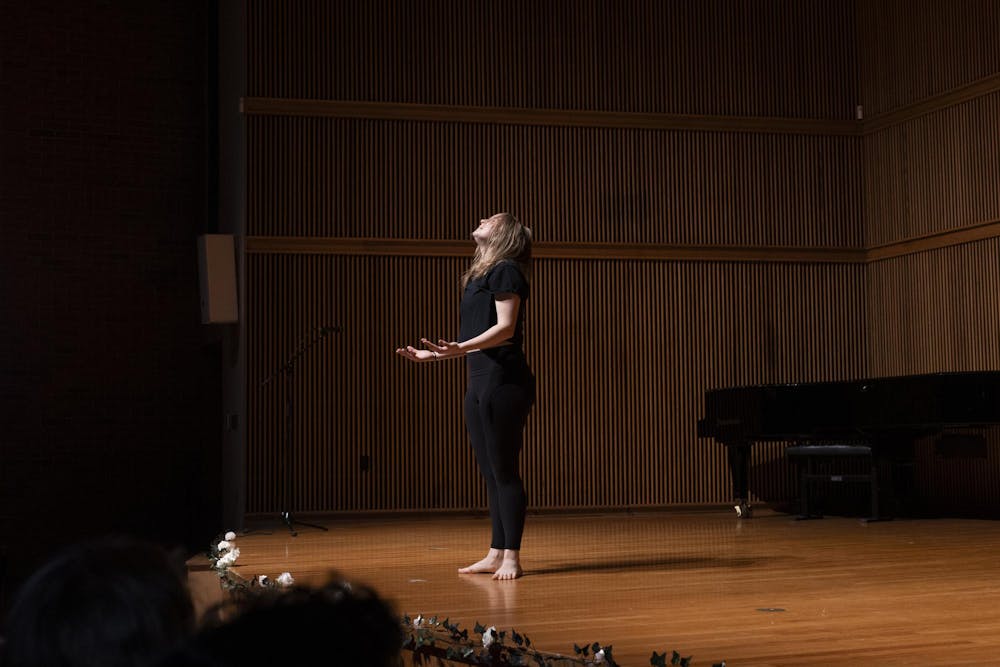In the softly lit recital hall of the Smith-Hermanson Music Center, a student’s voice echoed as she read the words, “You don’t tell me what I get to eat; my body is mine.”
Voices of Resilience welcomed students from across campus to share their mental health experiences through different mediums of art, sophomore Abby Portolese, PAX member, said.
The event was hosted by Taylor’s student-led mental health initiative club, PAX, on April 12 from seven to nine p.m. It showcased student talent through spoken word, poetry and dancing performances.
Several of the art pieces addressed deep and personal experiences.
Senior Art Education and Photography student Emily Mitchell choreographed a dance, titled, “I got myself a finish” that was about her experience recovering from an eating disorder.
“Just watching that as someone who myself struggled with that at one point—it hits something different in you,” sophomore Kylie Roggie, vice president of PAX, said. “So, I don't know; it's just a beautiful dance, and all the pieces were really compelling and really raw.”
Portolese wrote a poem titled “What Big Girls Do,” addressing the different experiences she had gone through, growing up. With simple and rhythmic brushstrokes, Portolese narrated the different preconceptions of girlhood and the growing pains of breaking out of the mold the world is telling us to fit into.
“It’s really just my heart on words,” she said.
Taylor doesn’t talk about mental health like it should, senior Eyoatam Workneh, president of PAX, said. While students are highly likely to participate in anonymous events like Stand Up for Your Sibling, it is a lot harder for one person to come out and say they struggle with depression or suicidal thoughts, she added.
Workneh attributed this to the stigma around Christian circles that someone who struggles with mental health can be seen as “less spiritual” or not as connected to God.
Portolese said that viewers should approach the art with an open heart. The title of the event is focused on resilience and sharing stories about that aspect, even though they are still being written. It gives all viewers an invitation to acknowledge that process.
“Some stories are more raw and hard to understand, and hard to identify with,” Portolese said. “But that doesn't make them any less honest and real.”
Even so, PAX wanted to make room for those who were not ready for their name to be signed under what they had created. Students were able to submit artwork anonymously to be on display.
While there were a maximum of ten performers that night, outside sat 30 to 40 art pieces and poetry, some attributed and others left blank, Roggie said. After the show, attendees spent a quarter of an hour reading these pieces and had the opportunity to leave their own stories and encouraging thoughts on paper.
“The main point is for people to see that they're not alone,” Workneh said.
When PAX was coming up with event ideas for this semester, they held a pitch competition. After the votes were cast, it was clear that Voices of Resilience would make its first appearance at Taylor, Roggie said.
PAX did encounter difficulties with the number of submissions for performances, she added. This was due to Airband tryouts happening around the same time. In the future, they would like to hold the event earlier in the semester.
Despite these issues, the event had a profound impact on those involved.
Workneh said that one of the performers came up to her afterward and asked why Voices of Resilience hadn’t been happening every year.
It was a healing process not just for those listening but also for the artists presenting, she said. Overall, this event created a safe space for people, and she hopes that the conversation isn’t done just yet.
“I think so easily it can be really, really difficult to just plainly verbalize the things we've gone through, the things we felt, the things we've seen,” Portolese said. “By moving our bodies, or by singing, or by sharing poetry, or by painting, they speak for themselves, so you only have to give your heart, and then the art itself will do the rest.”





